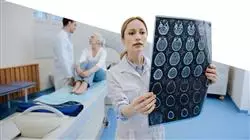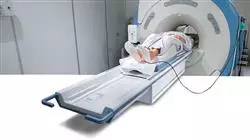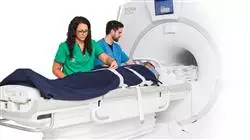University certificate
The world's largest faculty of medicine”
Why study at TECH?
Enroll now and start offering your patients the best treatments in Nuclear Medicine applied to Oncology"

Oncology is a complex field at the health and social level. This is an area that includes pathologies that are very harmful to health and for which, on occasions, there are no adequate treatments. In this context, Nuclear Medicine is an innovative scientific field that has been developing in recent decades to become one of the most important and promising for treating pathologies such as Oncology. For this reason, this Postgraduate diploma in Nuclear Oncologyoffers its students an in depth study of the subject through which doctors who take the course can become recognized specialists in this field.
To achieve this, this qualification offers specialized content on issues such as radioguided surgery, diagnostic imaging techniques such as PET/CT and PET/MRI or targeted therapy with radioligands. With this new knowledge, medical professionals who complete this program will be in a position to enhance their professional careers, enjoying numerous options to access the nuclear medicine services of the best clinics in the country.
Make accurate diagnoses of oncological diseases thanks to this Postgraduate diploma"
This Postgraduate diploma in Nuclear Oncology is the most complete and up to date educational program on the market. Its most notable features are:
- The development of case studies presented by experts in Oncology and Nuclear Medicine
- The graphic, schematic, and eminently practical contents with which they are created, provide scientific and practical information on the disciplines that are essential for professional practice
- Practical exercises where self assessment can be used to improve learning
- Its special emphasis on innovative methodologies
- Theoretical lessons, questions to the expert, debate forums on controversial topics, and individual reflection assignments
- Content that is accessible from any fixed or portable device with an Internet connection
When you finish this qualification you will be able to manage the Nuclear Medicine Department of a prestigious hospital in your country"
The program’s teaching staff includes professionals from the sector who contribute their work experience to this training program, as well as renowned specialists from leading societies and prestigious universities.
The multimedia content, developed with the latest educational technology, will provide the professional with situated and contextual learning, i.e., a simulated environment that will provide immersive training programmed to train in real situations.
This program is designed around Problem Based Learning, whereby the professional must try to solve the different professional practice situations that arise during the academic year. For this purpose, the student will be assisted by an innovative interactive video system created by renowned and experienced experts.
Apply the best techniques of Nuclear Medicine to treat oncology patients with great efficacy"

Don't wait any longer: enroll now and become a great specialist in Nuclear Oncology"
Syllabus
The contents of this Postgraduate diploma in Nuclear Oncology have been created by leading specialists in Nuclear Medicine and Oncology. Thanks to this, students who take the course will be able to enjoy the most innovative and up to date syllabus and will also be able to delve deeper into issues such as radioguided surgery, PET/CT and PET/MRI imaging methods and targeted therapy with radioligands. This knowledge will turn the doctors who obtain it into true experts in Nuclear Oncology.

The most up to date contents in Nuclear Oncology are here"
Module 1. Radioguided Surgery
1.1. Selective Biopsy of the Sentinel Ganglion (SBSG)
1.1.1. Detection with Radiopharmaceutical and Combined Techniques
1.1.1.1. Radiocolloids, Dyes
1.1.1.2. BSGC Breast Cancer
1.1.2. Initial Staging
1.1.3. In Neoadjuvant
1.2. BSGC Gynecologic Tumors
1.2.1. Vulva
1.2.2. Cervix
1.2.3. Endometrium
1.2.4. Ovaries
1.3. BSGCS kin Cancer
1.3.1. Melanoma
1.3.2. Non melanoma
1.4. BSGC Head and Neck Tumors
1.4.1. Thyroid Cancer
1.4.2. Oral Cavity
1.5. BSGC Gastrointestinal Tumors
1.5.1. Oesophageal Cancer
1.5.2. Stomach Cancer
1.5.3. Colorectal Carcinoma
1.6. BSGC Urological Cancers
1.6.1. Penis
1.6.2. Prostate
1.7. Combined Technique of BSGC and Radioguided Occult Lesion Localization (ROLL)
1.7.1. Breast
1.7.2. Other Locations
1.8. ROLL
1.8.1. Radiopharmaceuticals 99mTc, Seeds 125-I
1.8.2. Indications: Tumor Pathology and Other Applications
1.9. Radioguided Surgery in Primary Hyperparathyroidism
1.9.1. Indications
1.9.2. Protocols According to Radiopharmaceuticals
Module 2. PET/CT- PET/MRI in Oncology Clinical Guidelines
2.1. Nuclear Medicine in Different Tumors
2.1.1. Staging and Prognosis
2.1.2. Response to Treatment
2.1.3. Monitoring and Diagnosis of Recurrence
2.2. Lymphomas
2.2.1. Hodking's Lymphoma
2.2.2. Diffuse Large B-cell Lymphoma
2.2.3. Other Lymphomas
2.3. Breast Cancer
2.3.1. Initial Staging
2.3.2. Response to Neoadjuvant
2.3.3. Monitoring
2.4. Gynecologic Tumors
2.4.1. Vagina Cervix: Staging, Response to Treatment and Monitoring
2.4.2. Endometrium: Staging, Response to Treatment and Monitoring
2.4.3. Ovaries: Staging, Response to Treatment and Monitoring
2.5. Lung Cancer
2.5.1. Non-small Cell Lung Carcinoma
2.5.2. Small Cell Lung Carcinoma
2.5.3. Response Assessment: Radiotherapy, Immunotherapy
2.6. Digestive System Tumors
2.6.1. Esophago-Gastric
2.6.2. Colorectal
2.6.3. Pancreas
2.6.4. Hepatobiliary: Hepatocarcinoma, Cholangiocarcinoma
2.7. Sarcomas
2.7.1. Bones
2.7.2. Soft Parts
2.8. Urogenitals
2.8.1. Prostate
2.8.2. Renal
2.8.3. Bladder
2.8.4. Testicle
2.9. Endocrine
2.9.1. Thyroid
2.9.2. Adrenal Gland
2.10. Radiotherapy Planning
2.10.1. Acquisition of Exploration
2.10.2. Volume Delimitation
Module 3. Radioligand Targeted Therapy
3.1. Teragnosis
3.1.1. Clinical and Therapeutic Implications
3.2. Thyroid
3.2.1. Hyperthyroidism
3.2.2. Differentiated Thyroid Carcinoma
3.2.3. Goiter
3.3. Neuroendocrine, Gastroenteropancreatic and Other Tumors: Radiolabeled Peptides
3.3.1. Indications
3.3.2. Administration
3.4. Pheochromocytoma and Paragangliomas: 131I-MIBG
3.4.1. Indications and Patient Selection
3.4.2. Administration Protocols
3.4.3. Results
3.5. Bone Metastases
3.5.1. Pathophysiology of Bone Metastases
3.5.2. Basis of Radiometabolic Therapy
3.5.3. Radiopharmaceuticals Used: Indications and Results
3.6. Selective Internal Radiation Therapy (SIRT): Labeled Microspheres
3.6.1. Basis of Therapy with Radiolabeled Microspheres
3.6.2. Available Devices: Differential Characteristics
3.6.3. Calculation of the Activity to be Administered and Dosimetric Assessment according to the Device
3.6.4. Hepatocarcinoma: Application and Results
3.6.5. Liver Metastases: Application and Results in Colorectal Carcinoma, Neuroendocrine and Other Tumors
3.6.6. Contributions of SIRT to Liver Surgery
3.6.7. Potentially Resectable Patient
3.6.8. Hepatic Lobe Hypertrophy
3.7. Synoviorthesis
3.7.1. Pathophysiological Basis of Treatment
3.7.2. Radiopharmaceuticals Used
3.7.3. Indications and Clinical Experience in Different Locations and Pathologies: Rheumatoid Arthritis, Other Arthritis, Vellonodular Synovitis
3.7.4. Applications in Pediatrics: Hemophilic Patient
3.8. Metastatic Prostate Cancer: 177Lu-PSMA
3.8.1. Pathophysiological Bases
3.8.2. Patient Selection
3.8.3. Management Protocols and Results
3.9. Lymphomas: Radioimmunotherapy
3.9.1. Pathophysiological Bases
3.9.2. Indications
3.9.3. Administration Protocols
3.10. Future
3.10.1. Search for New Ligands and Radioisotopes
3.10.2. Translational Research
3.10.3. Research Lines

Make the most of the opportunity and take the step to get up to date on the latest developments in Nuclear Oncology”
Postgraduate Diploma in Nuclear Oncology
TECH Global University's Postgraduate Diploma in Nuclear Oncology offers you the opportunity to become an expert in the fight against cancer. Through our world-class program, you will acquire the knowledge and skills necessary to apply nuclear technology in the diagnosis and treatment of oncologic diseases. We understand the importance of flexibility in your learning. That's why our online classes allow you to access your learning from anywhere, anytime. Take advantage of this opportunity to study at your own pace, without compromising your current responsibilities. During the 6-month program, you will immerse yourself in the exciting world of nuclear oncology. You will learn the most advanced techniques for diagnostic imaging, targeted therapy and monitoring of oncology patients.
Specialize in the cutting edge of nuclear oncology with our world-class program.
When you enroll in the Postgraduate Diploma in Nuclear Oncology, you'll have a highly qualified faculty with extensive experience in the field of nuclear medicine. They will guide you throughout the program, providing personalized feedback and sharing their expertise to help you achieve your career goals. Upon completion of this fellowship, you will be prepared to meet the challenges of nuclear oncology. You will be able to make accurate diagnoses, evaluate treatment response and contribute to the comprehensive care of oncology patients. In addition, TECH will award you with a recognized certificate, supporting your acquired skills and knowledge. Don't miss the opportunity to make a difference in the fight against cancer - enroll today and contribute to the advancement of medicine in the field of oncology!







